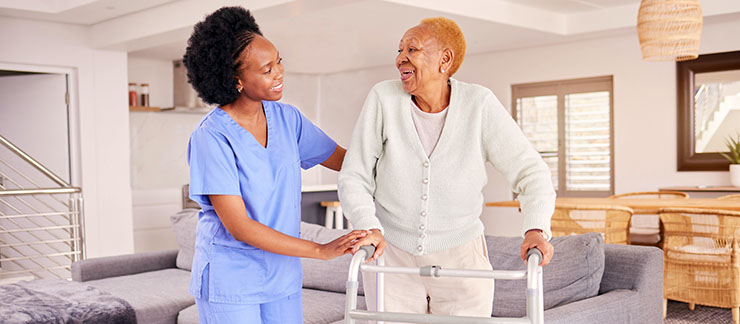
5 Things That Increase Fall Risks for Seniors at Home
One in four seniors in the U.S. experiences a significant fall each year, according to the Centers for Disease Control and Prevention (CDC). Approximately 37% of those falls require medical treatment—ranging from minor bruises to broken bones or head trauma. Injuries can be more serious with at advanced ages.
Although it's impossible to completely eliminate a fall for an aging loved one, you can reduce their chances by being aware of risk factors in their home that can lead to a devastating fall.
Fall Risk Factors and Solutions for Seniors
Maintaining balance and mobility becomes increasingly crucial as seniors age to mitigate fall risks. Falls can lead to serious injuries, diminished quality of life, and even loss of independence. Understanding the key factors that contribute to fall risk, such as physical weakness, environmental hazards, and certain medications, is essential for developing effective prevention strategies.
Below are common fall risk factors and practical solutions to help your aging loved one preserve their safety and independence at home.
- Obstructed Pathways
We’ve all experienced stubbing a toe during a midnight snack run after a family member rearranged the furniture. Older adults with cognitive or vision difficulties who rely on muscle memory to navigate their homes are especially at risk when this happens.
Obstructed pathways, loose rugs, and scattered cords can lead to a fall. Clearing pathways in your loved one’s home and removing or securing loose items can reduce fall risks. Consider installing night lights as part of your at-home fall prevention strategy.
- Illnesses
From the common cold to urinary tract infections in seniors, an acute illness can cause lingering disorientation. Recovery can weaken the body, affecting balance and coordination. A condition called post-hospital syndrome, which causes confusion, fatigue, weakness, and changes in sleep and digestive patterns after a hospital stay, can also occur.
Consider a temporary update of your senior’s home care schedule in the weeks after an illness. You can work with your local Visiting Angels office to add or rearrange caregiver visits so your loved one has extra support at home to reduce the risk of falls.
- Storing Items Too High
Avoid storing frequently used items on shelves or tall cabinets in your senior’s home. Instead, store them within easy reach, between shoulder and waist height. This reduces the need for your loved one to climb on a step stool or overreach, which can cause a lack of balance or a fall. Ensure shelves are stable and securely mounted to prevent tipping or falling items.
- New Medical Devices
Getting accustomed to a new medical device can inadvertently increase the risk of falls. Devices such as canes and walkers that are incorrectly adjusted or lacking secure grips can lead to instability. In addition, cords or tubing from medical equipment can create tripping hazards.
Follow setup instructions provided by your loved one’s healthcare team to ensure devices are adjusted correctly. Secure loose cords and tubing hooked to mobile equipment, such as an oxygen pack.
- New Medication
Starting new medication, such as beta-blockers or diuretics, can cause dizziness or lightheadedness (especially upon standing). Medications prescribed for anxiety or sleep disorders can also impair balance and coordination. These side effects can increase the risk of falls among older adults.
Monitor for side effects of new medications and encourage your loved one to follow their healthcare provider's directions for dosage and timing. If they struggle to remember their medication schedule, a Visiting Angels caregiver can provide timely reminders to ensure they take their medicine as prescribed.
Related Reading: Free "Safe & Steady® Fall Prevention Resource Guide" from Visiting Angels
Professional Senior Care Can Reduce Fall Risk
Preventing falls among older adults is crucial for their safety at home. By recognizing and addressing common fall risks, you can take proactive steps to create a safer environment for your aging loved one.
If you or a loved one needs assistance managing these challenges, consider contacting Visiting Angels senior care services. Our devoted caregivers can provide compassionate support to help your senior reduce their fall risk at home.
Contact us today to learn more.


